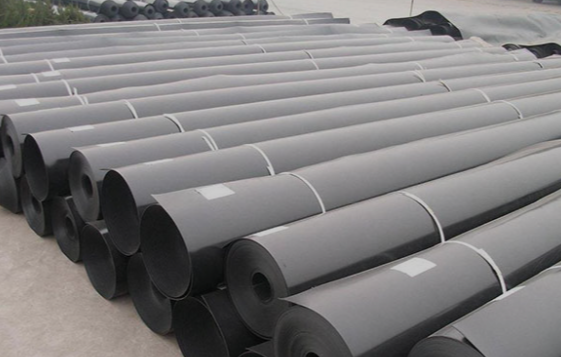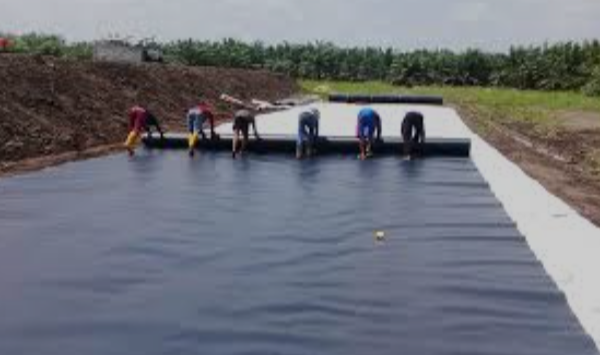- Understanding the Role of Geomembrane Liners in Waste Management
- Innovations in Geomembrane Liners for Water Management
- Geomembrane Liners: A Comprehensive Guide
- The Future of Geomembrane Liners in Civil Engineering
- Geomembrane Liners: Enhancing Landfill Stability
Manager:Alvin Wang
WhatsApp:+62 8983806051
Tel:+86 10-5797-1075
Email:steelwang@okorder.com
Address:3rd Floor, No.2 Building, No.1 Sanlihe Road
Does HDPE geomembrane crack easily?
hdpe Geomembrane made of high density polyethylene is common material in civil engineering and environmental use because of its toughness, pliability and impermeability. From constructing landfills and ponds to covering irrigation canals and wastewater treatment plants, HDPE geomembranes are vital in prevention of liquid/gas leakage as well as safeguarding the environment. However, some fears may arise regarding whether it is prone to cracking or not. This article tries to answer the question; does HDPE geomembrane crack easily?

Knowing HDPE Geomembrane
Before we talk about how it cracks, let us go through what HDPE geomembrane entails. High-density Polyethylene (HDPE) geomembranes are synthetic liners made from high density polyethylene resin. As a thermoplastic, this substance exhibits exceptional resistance to chemicals, physical force and flexibility that renders it useful in many containment situations.
Plasticity And Endurance
The key advantage of using HDPE geomembranes lies in their plasticity that allows them to adapt any irregular shape thereby avoiding any rupture within the structure due to ground movements without compromising on its soundness/ effectiveness. Furthermore, this liner has high tear puncture resistance properties as well as UV degradation resistant so as to ensure that they have long lasting service life under harsh climatic conditions.
Impenetrability
High-density polythene type geosynthetic liner prevents liquors and gaseous substances from moving across its thicknesses effectively. In containment structures like landfill sites or waste water treatment facilities, where minimum disposal surrounding contamination cannot be overemphasized.
Cracking Dilemma
Herein is a discussion on when certain instances cause doubts which revolve around the possibility of HDPE geomembranes cracking though known for their strength and flexibility: Examples include:
Temperature Variations
Temperature changes on extreme scale may cause thermal expansion and contraction of HDPE geomembranes resulting in rigidness that may cause them to crack. Temperature-induced cracking may occur if a geosynthetic liner fails to account for thermal movements, especially in regions with large temperature changes like desert areas or highland locations.
Bad Practices of Installation
Poor installation methodologies such as; inadequate surface preparation, wrong welding methods and poor seam quality might give rise to problems of integrity on the HDPE liner as well as augmenting the probability of it cracking. Perfectly done installation should be able to ensure seam integrity, watertight seals and overall performance of the geomembrane liner.
Chemical Exposure
Exposure to harsh chemicals or aggressive substances can weaken the molecular structure of HDPE geomembrane, making it more susceptible to cracking. Over time, acids, alkalis, solvents and hydrocarbons can degrade polymer chains forming this layer thereby jeopardizing mechanical properties for instance tensile strength and increasing susceptibility towards fatigue failure.
Mechnical Damage
This includes but is not limited to sharp object impacts (puncturing), abrasion from heavy machines (tearing) and pressure exerted from above materials such as soil (rupturing). Proper handling techniques together with maintenance procedures are necessary in order to avoid any physical damage on these liners.
Preventive Measures
Some preventive measures can reduce or prevent HDPE geomembrane cracking which include:
Designing and Engineering Correctly
Good design and engineering practices are crucial for ensuring successful long-term service life of Geomembranes made out of high-density polyethylene (HDPE). Geomembrane system should be developed taking into account factors such as different temperatures/seasons experienced there during use, chemical applications, ground conditions etc.
Quality Control
The manufacturing, installation and maintenance stages need to have rigorous quality assurance measures to ensure that the HDPE geomembrane liners are in their best states. This is done through material testing, seam inspections and periodic assessments which identify any possible faults, weaknesses or signs of deterioration that may result into cracking.
Protective Measures
Protective measures such as geotextile cushioning, drainage layers and protective coatings help to mitigate against mechanical damage of HDPE geomembrane liners. These extra films provide for cushioning, support, abrasion resistance reducing the likelihood of cracking or puncture by external forces.

Conclusion
In conclusion however durability and flexibility being its notable attributes HDPE geomembrane also has a potentiality of getting cracked under some circumstances.This means factors such as temperature variations, poor installation practices, chemical exposure and mechanical damage can contribute to cracking in HDPE geomembrane liners.By taking preventive measures including proper design and engineering works; quality control; protective measures; however the occurrence of this problem can be greatly reduced as far as containment applications are concerned leading to long-term performance and reliability.
-
2024-12-05Geomembrane Liners: A Comprehensive Guide






